Global Attitudes and Business Environment: A Comprehensive Analysis
VerifiedAdded on 2020/11/09
|11
|2532
|44
Essay
AI Summary
This essay delves into the complexities of the global business environment, emphasizing the impact of differing attitudes and practices across cultures. It introduces the concepts of ethnocentric, polycentric, and geocentric attitudes, illustrating their effects on business operations. The essay explores the advantages and disadvantages of each approach, providing examples and real-world scenarios. It also examines the importance of understanding the European Union (EU) and regional trade alliances in the context of global business. Furthermore, the essay highlights the significance of considering cultural differences and national customs to optimize business strategies and reduce operational costs. The analysis underscores the need for business managers to be sensitive to global perspectives and to adopt approaches that foster effective cross-cultural management.
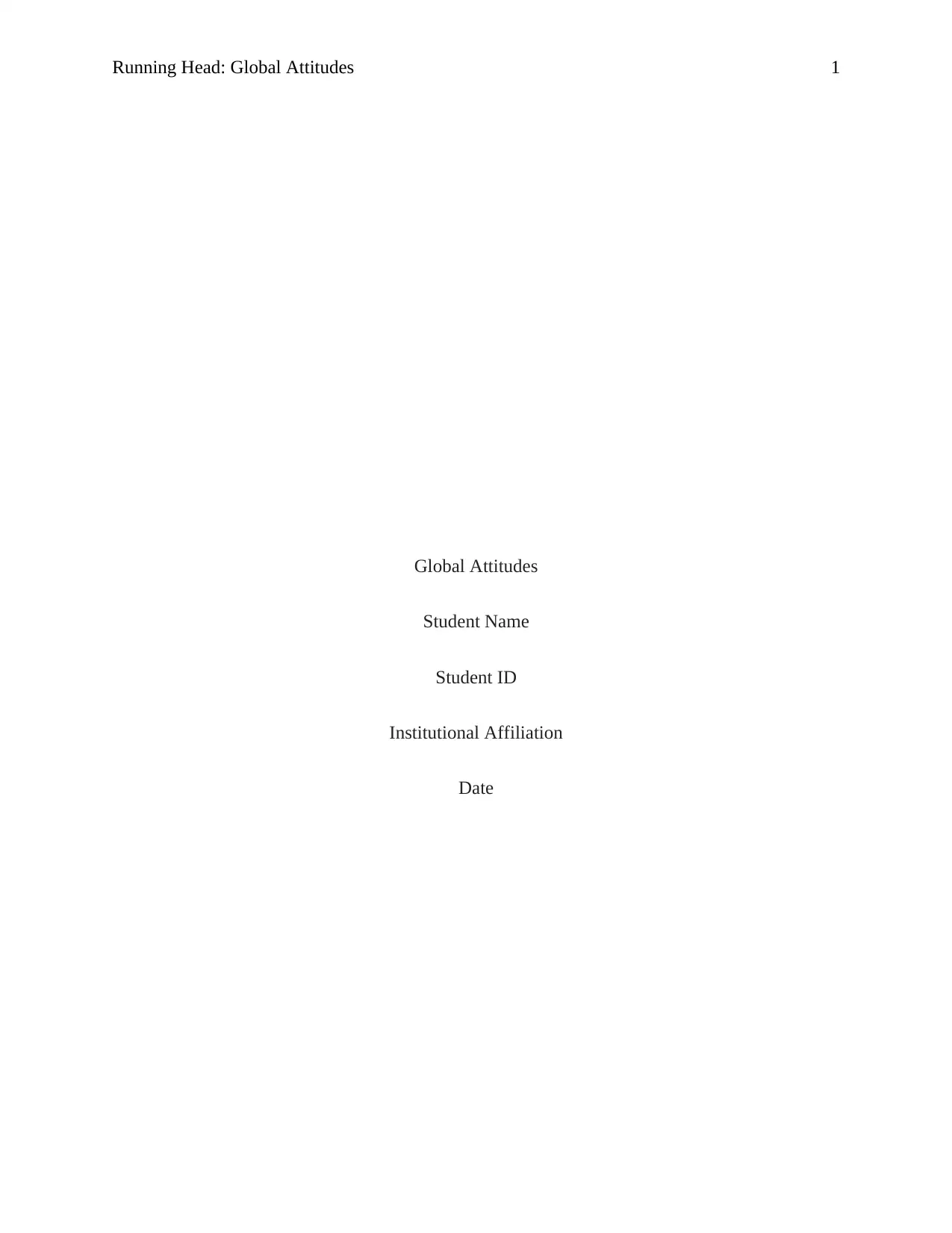
Running Head: Global Attitudes 1
Global Attitudes
Student Name
Student ID
Institutional Affiliation
Date
Global Attitudes
Student Name
Student ID
Institutional Affiliation
Date
Paraphrase This Document
Need a fresh take? Get an instant paraphrase of this document with our AI Paraphraser
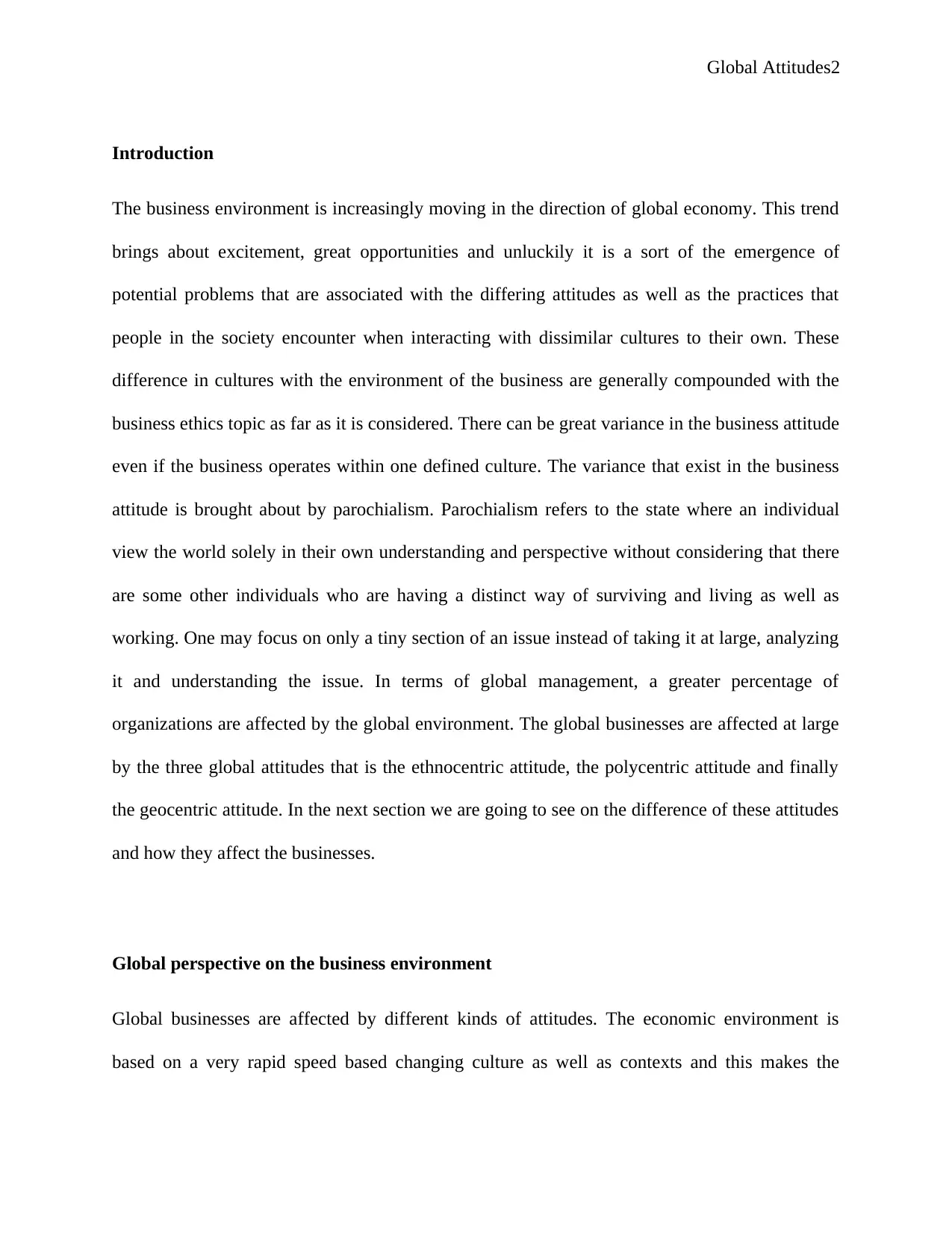
Global Attitudes2
Introduction
The business environment is increasingly moving in the direction of global economy. This trend
brings about excitement, great opportunities and unluckily it is a sort of the emergence of
potential problems that are associated with the differing attitudes as well as the practices that
people in the society encounter when interacting with dissimilar cultures to their own. These
difference in cultures with the environment of the business are generally compounded with the
business ethics topic as far as it is considered. There can be great variance in the business attitude
even if the business operates within one defined culture. The variance that exist in the business
attitude is brought about by parochialism. Parochialism refers to the state where an individual
view the world solely in their own understanding and perspective without considering that there
are some other individuals who are having a distinct way of surviving and living as well as
working. One may focus on only a tiny section of an issue instead of taking it at large, analyzing
it and understanding the issue. In terms of global management, a greater percentage of
organizations are affected by the global environment. The global businesses are affected at large
by the three global attitudes that is the ethnocentric attitude, the polycentric attitude and finally
the geocentric attitude. In the next section we are going to see on the difference of these attitudes
and how they affect the businesses.
Global perspective on the business environment
Global businesses are affected by different kinds of attitudes. The economic environment is
based on a very rapid speed based changing culture as well as contexts and this makes the
Introduction
The business environment is increasingly moving in the direction of global economy. This trend
brings about excitement, great opportunities and unluckily it is a sort of the emergence of
potential problems that are associated with the differing attitudes as well as the practices that
people in the society encounter when interacting with dissimilar cultures to their own. These
difference in cultures with the environment of the business are generally compounded with the
business ethics topic as far as it is considered. There can be great variance in the business attitude
even if the business operates within one defined culture. The variance that exist in the business
attitude is brought about by parochialism. Parochialism refers to the state where an individual
view the world solely in their own understanding and perspective without considering that there
are some other individuals who are having a distinct way of surviving and living as well as
working. One may focus on only a tiny section of an issue instead of taking it at large, analyzing
it and understanding the issue. In terms of global management, a greater percentage of
organizations are affected by the global environment. The global businesses are affected at large
by the three global attitudes that is the ethnocentric attitude, the polycentric attitude and finally
the geocentric attitude. In the next section we are going to see on the difference of these attitudes
and how they affect the businesses.
Global perspective on the business environment
Global businesses are affected by different kinds of attitudes. The economic environment is
based on a very rapid speed based changing culture as well as contexts and this makes the
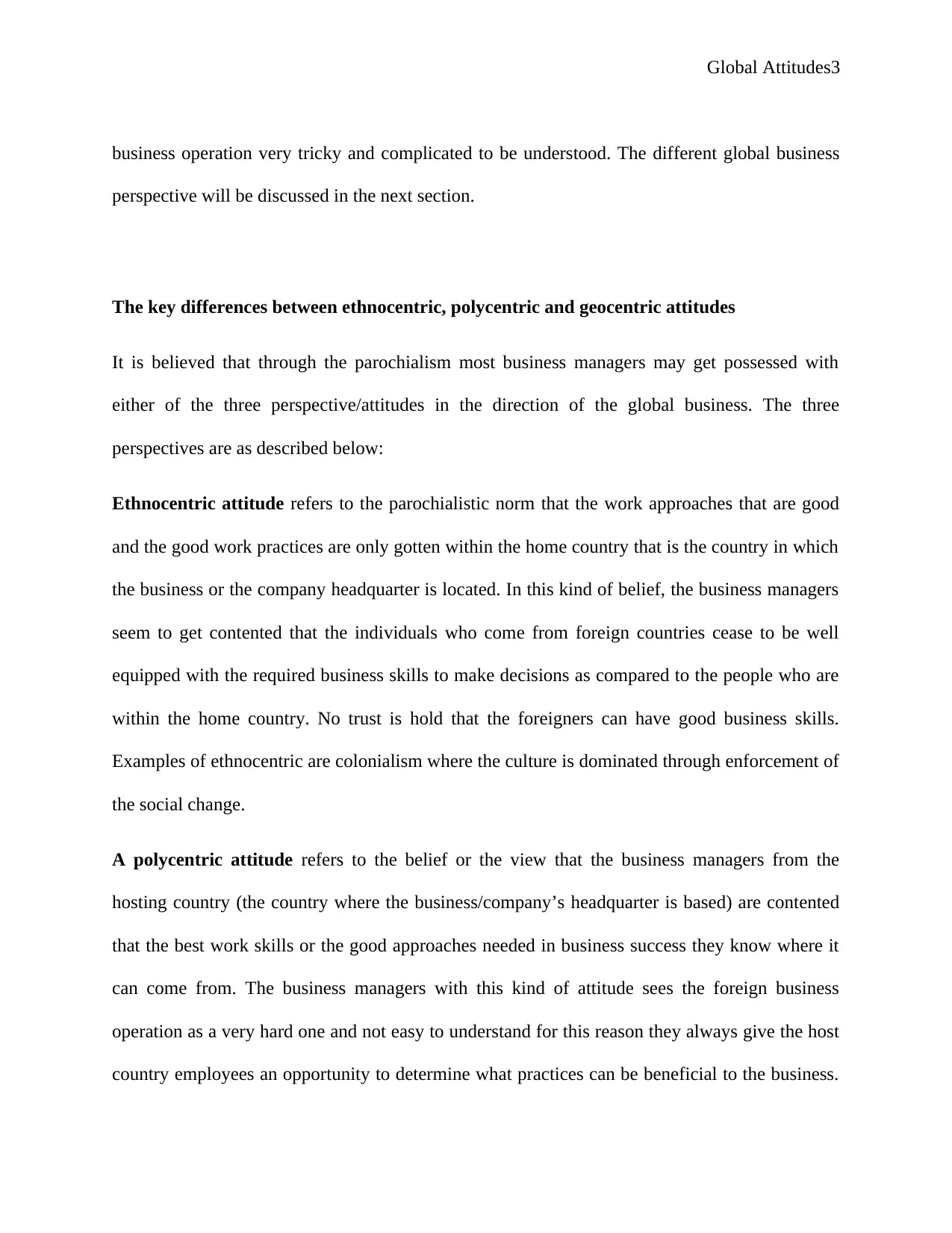
Global Attitudes3
business operation very tricky and complicated to be understood. The different global business
perspective will be discussed in the next section.
The key differences between ethnocentric, polycentric and geocentric attitudes
It is believed that through the parochialism most business managers may get possessed with
either of the three perspective/attitudes in the direction of the global business. The three
perspectives are as described below:
Ethnocentric attitude refers to the parochialistic norm that the work approaches that are good
and the good work practices are only gotten within the home country that is the country in which
the business or the company headquarter is located. In this kind of belief, the business managers
seem to get contented that the individuals who come from foreign countries cease to be well
equipped with the required business skills to make decisions as compared to the people who are
within the home country. No trust is hold that the foreigners can have good business skills.
Examples of ethnocentric are colonialism where the culture is dominated through enforcement of
the social change.
A polycentric attitude refers to the belief or the view that the business managers from the
hosting country (the country where the business/company’s headquarter is based) are contented
that the best work skills or the good approaches needed in business success they know where it
can come from. The business managers with this kind of attitude sees the foreign business
operation as a very hard one and not easy to understand for this reason they always give the host
country employees an opportunity to determine what practices can be beneficial to the business.
business operation very tricky and complicated to be understood. The different global business
perspective will be discussed in the next section.
The key differences between ethnocentric, polycentric and geocentric attitudes
It is believed that through the parochialism most business managers may get possessed with
either of the three perspective/attitudes in the direction of the global business. The three
perspectives are as described below:
Ethnocentric attitude refers to the parochialistic norm that the work approaches that are good
and the good work practices are only gotten within the home country that is the country in which
the business or the company headquarter is located. In this kind of belief, the business managers
seem to get contented that the individuals who come from foreign countries cease to be well
equipped with the required business skills to make decisions as compared to the people who are
within the home country. No trust is hold that the foreigners can have good business skills.
Examples of ethnocentric are colonialism where the culture is dominated through enforcement of
the social change.
A polycentric attitude refers to the belief or the view that the business managers from the
hosting country (the country where the business/company’s headquarter is based) are contented
that the best work skills or the good approaches needed in business success they know where it
can come from. The business managers with this kind of attitude sees the foreign business
operation as a very hard one and not easy to understand for this reason they always give the host
country employees an opportunity to determine what practices can be beneficial to the business.
⊘ This is a preview!⊘
Do you want full access?
Subscribe today to unlock all pages.

Trusted by 1+ million students worldwide
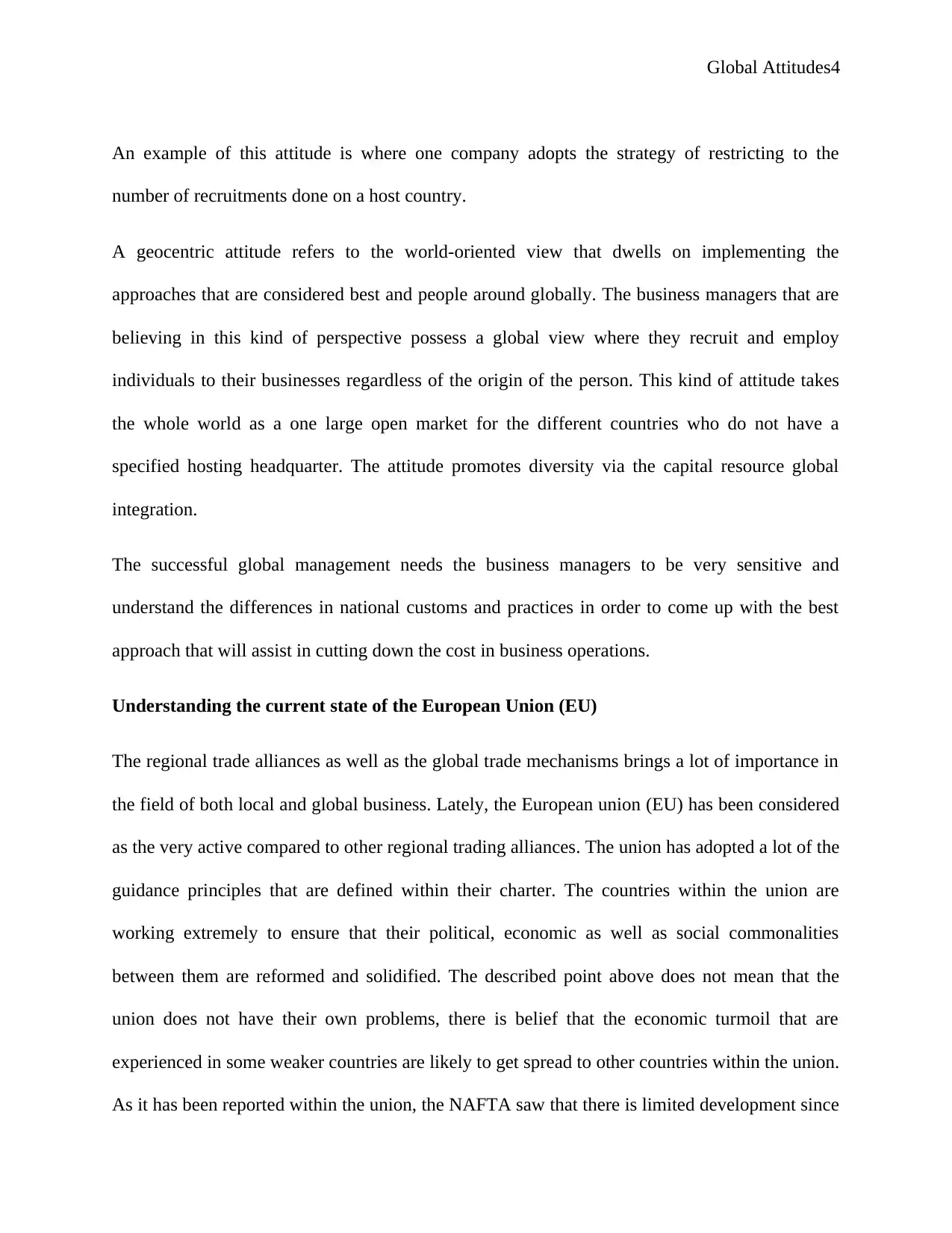
Global Attitudes4
An example of this attitude is where one company adopts the strategy of restricting to the
number of recruitments done on a host country.
A geocentric attitude refers to the world-oriented view that dwells on implementing the
approaches that are considered best and people around globally. The business managers that are
believing in this kind of perspective possess a global view where they recruit and employ
individuals to their businesses regardless of the origin of the person. This kind of attitude takes
the whole world as a one large open market for the different countries who do not have a
specified hosting headquarter. The attitude promotes diversity via the capital resource global
integration.
The successful global management needs the business managers to be very sensitive and
understand the differences in national customs and practices in order to come up with the best
approach that will assist in cutting down the cost in business operations.
Understanding the current state of the European Union (EU)
The regional trade alliances as well as the global trade mechanisms brings a lot of importance in
the field of both local and global business. Lately, the European union (EU) has been considered
as the very active compared to other regional trading alliances. The union has adopted a lot of the
guidance principles that are defined within their charter. The countries within the union are
working extremely to ensure that their political, economic as well as social commonalities
between them are reformed and solidified. The described point above does not mean that the
union does not have their own problems, there is belief that the economic turmoil that are
experienced in some weaker countries are likely to get spread to other countries within the union.
As it has been reported within the union, the NAFTA saw that there is limited development since
An example of this attitude is where one company adopts the strategy of restricting to the
number of recruitments done on a host country.
A geocentric attitude refers to the world-oriented view that dwells on implementing the
approaches that are considered best and people around globally. The business managers that are
believing in this kind of perspective possess a global view where they recruit and employ
individuals to their businesses regardless of the origin of the person. This kind of attitude takes
the whole world as a one large open market for the different countries who do not have a
specified hosting headquarter. The attitude promotes diversity via the capital resource global
integration.
The successful global management needs the business managers to be very sensitive and
understand the differences in national customs and practices in order to come up with the best
approach that will assist in cutting down the cost in business operations.
Understanding the current state of the European Union (EU)
The regional trade alliances as well as the global trade mechanisms brings a lot of importance in
the field of both local and global business. Lately, the European union (EU) has been considered
as the very active compared to other regional trading alliances. The union has adopted a lot of the
guidance principles that are defined within their charter. The countries within the union are
working extremely to ensure that their political, economic as well as social commonalities
between them are reformed and solidified. The described point above does not mean that the
union does not have their own problems, there is belief that the economic turmoil that are
experienced in some weaker countries are likely to get spread to other countries within the union.
As it has been reported within the union, the NAFTA saw that there is limited development since
Paraphrase This Document
Need a fresh take? Get an instant paraphrase of this document with our AI Paraphraser
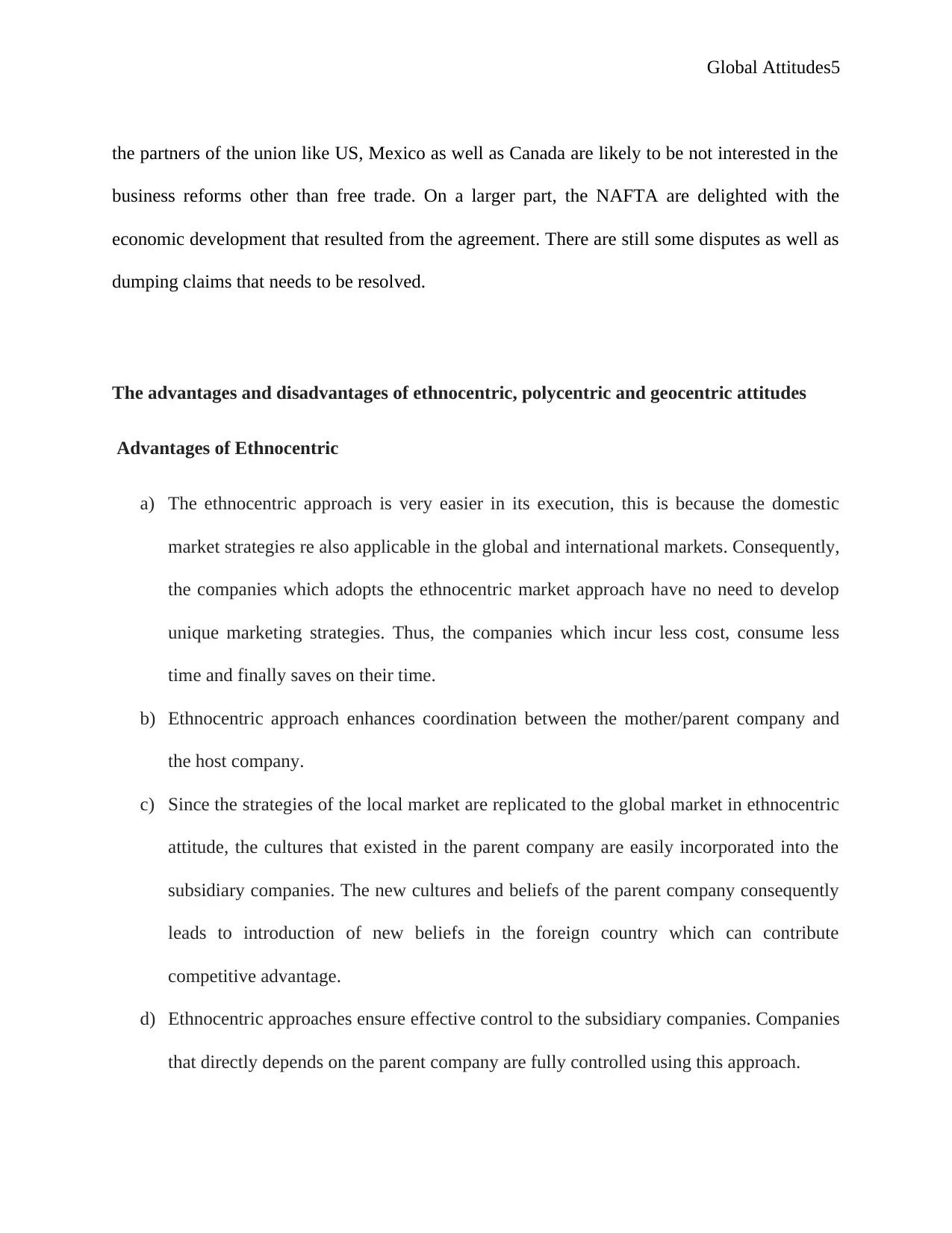
Global Attitudes5
the partners of the union like US, Mexico as well as Canada are likely to be not interested in the
business reforms other than free trade. On a larger part, the NAFTA are delighted with the
economic development that resulted from the agreement. There are still some disputes as well as
dumping claims that needs to be resolved.
The advantages and disadvantages of ethnocentric, polycentric and geocentric attitudes
Advantages of Ethnocentric
a) The ethnocentric approach is very easier in its execution, this is because the domestic
market strategies re also applicable in the global and international markets. Consequently,
the companies which adopts the ethnocentric market approach have no need to develop
unique marketing strategies. Thus, the companies which incur less cost, consume less
time and finally saves on their time.
b) Ethnocentric approach enhances coordination between the mother/parent company and
the host company.
c) Since the strategies of the local market are replicated to the global market in ethnocentric
attitude, the cultures that existed in the parent company are easily incorporated into the
subsidiary companies. The new cultures and beliefs of the parent company consequently
leads to introduction of new beliefs in the foreign country which can contribute
competitive advantage.
d) Ethnocentric approaches ensure effective control to the subsidiary companies. Companies
that directly depends on the parent company are fully controlled using this approach.
the partners of the union like US, Mexico as well as Canada are likely to be not interested in the
business reforms other than free trade. On a larger part, the NAFTA are delighted with the
economic development that resulted from the agreement. There are still some disputes as well as
dumping claims that needs to be resolved.
The advantages and disadvantages of ethnocentric, polycentric and geocentric attitudes
Advantages of Ethnocentric
a) The ethnocentric approach is very easier in its execution, this is because the domestic
market strategies re also applicable in the global and international markets. Consequently,
the companies which adopts the ethnocentric market approach have no need to develop
unique marketing strategies. Thus, the companies which incur less cost, consume less
time and finally saves on their time.
b) Ethnocentric approach enhances coordination between the mother/parent company and
the host company.
c) Since the strategies of the local market are replicated to the global market in ethnocentric
attitude, the cultures that existed in the parent company are easily incorporated into the
subsidiary companies. The new cultures and beliefs of the parent company consequently
leads to introduction of new beliefs in the foreign country which can contribute
competitive advantage.
d) Ethnocentric approaches ensure effective control to the subsidiary companies. Companies
that directly depends on the parent company are fully controlled using this approach.
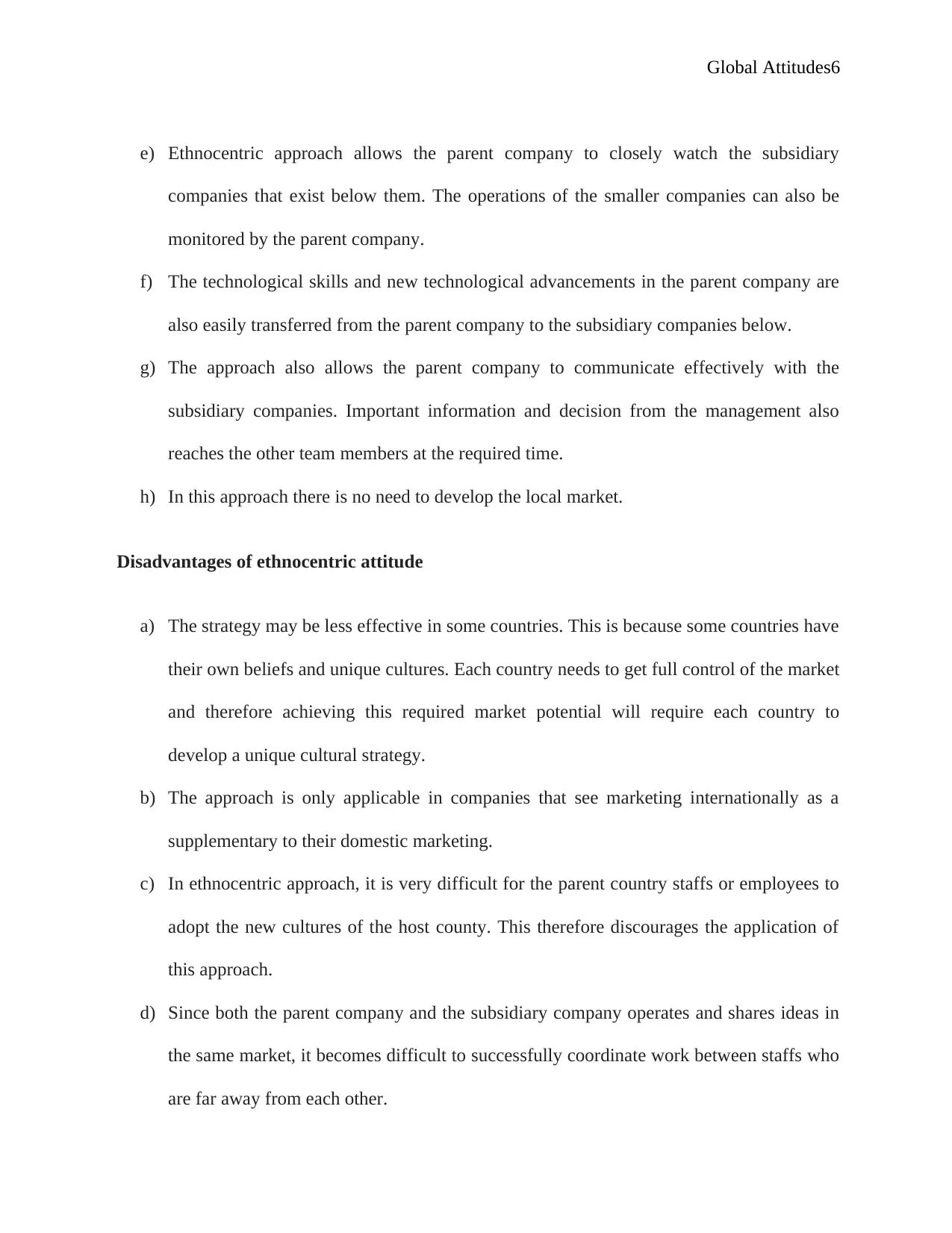
Global Attitudes6
e) Ethnocentric approach allows the parent company to closely watch the subsidiary
companies that exist below them. The operations of the smaller companies can also be
monitored by the parent company.
f) The technological skills and new technological advancements in the parent company are
also easily transferred from the parent company to the subsidiary companies below.
g) The approach also allows the parent company to communicate effectively with the
subsidiary companies. Important information and decision from the management also
reaches the other team members at the required time.
h) In this approach there is no need to develop the local market.
Disadvantages of ethnocentric attitude
a) The strategy may be less effective in some countries. This is because some countries have
their own beliefs and unique cultures. Each country needs to get full control of the market
and therefore achieving this required market potential will require each country to
develop a unique cultural strategy.
b) The approach is only applicable in companies that see marketing internationally as a
supplementary to their domestic marketing.
c) In ethnocentric approach, it is very difficult for the parent country staffs or employees to
adopt the new cultures of the host county. This therefore discourages the application of
this approach.
d) Since both the parent company and the subsidiary company operates and shares ideas in
the same market, it becomes difficult to successfully coordinate work between staffs who
are far away from each other.
e) Ethnocentric approach allows the parent company to closely watch the subsidiary
companies that exist below them. The operations of the smaller companies can also be
monitored by the parent company.
f) The technological skills and new technological advancements in the parent company are
also easily transferred from the parent company to the subsidiary companies below.
g) The approach also allows the parent company to communicate effectively with the
subsidiary companies. Important information and decision from the management also
reaches the other team members at the required time.
h) In this approach there is no need to develop the local market.
Disadvantages of ethnocentric attitude
a) The strategy may be less effective in some countries. This is because some countries have
their own beliefs and unique cultures. Each country needs to get full control of the market
and therefore achieving this required market potential will require each country to
develop a unique cultural strategy.
b) The approach is only applicable in companies that see marketing internationally as a
supplementary to their domestic marketing.
c) In ethnocentric approach, it is very difficult for the parent country staffs or employees to
adopt the new cultures of the host county. This therefore discourages the application of
this approach.
d) Since both the parent company and the subsidiary company operates and shares ideas in
the same market, it becomes difficult to successfully coordinate work between staffs who
are far away from each other.
⊘ This is a preview!⊘
Do you want full access?
Subscribe today to unlock all pages.

Trusted by 1+ million students worldwide
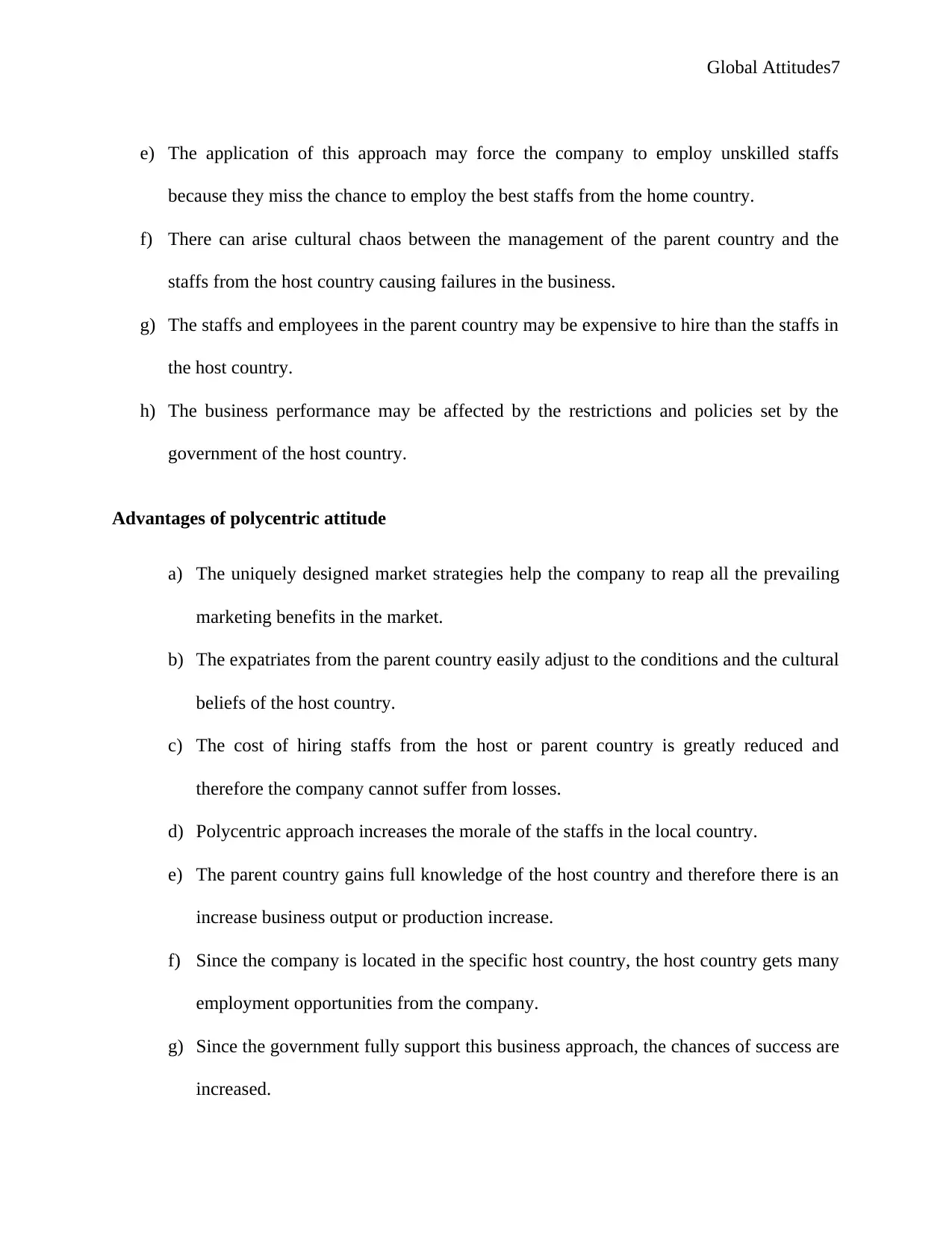
Global Attitudes7
e) The application of this approach may force the company to employ unskilled staffs
because they miss the chance to employ the best staffs from the home country.
f) There can arise cultural chaos between the management of the parent country and the
staffs from the host country causing failures in the business.
g) The staffs and employees in the parent country may be expensive to hire than the staffs in
the host country.
h) The business performance may be affected by the restrictions and policies set by the
government of the host country.
Advantages of polycentric attitude
a) The uniquely designed market strategies help the company to reap all the prevailing
marketing benefits in the market.
b) The expatriates from the parent country easily adjust to the conditions and the cultural
beliefs of the host country.
c) The cost of hiring staffs from the host or parent country is greatly reduced and
therefore the company cannot suffer from losses.
d) Polycentric approach increases the morale of the staffs in the local country.
e) The parent country gains full knowledge of the host country and therefore there is an
increase business output or production increase.
f) Since the company is located in the specific host country, the host country gets many
employment opportunities from the company.
g) Since the government fully support this business approach, the chances of success are
increased.
e) The application of this approach may force the company to employ unskilled staffs
because they miss the chance to employ the best staffs from the home country.
f) There can arise cultural chaos between the management of the parent country and the
staffs from the host country causing failures in the business.
g) The staffs and employees in the parent country may be expensive to hire than the staffs in
the host country.
h) The business performance may be affected by the restrictions and policies set by the
government of the host country.
Advantages of polycentric attitude
a) The uniquely designed market strategies help the company to reap all the prevailing
marketing benefits in the market.
b) The expatriates from the parent country easily adjust to the conditions and the cultural
beliefs of the host country.
c) The cost of hiring staffs from the host or parent country is greatly reduced and
therefore the company cannot suffer from losses.
d) Polycentric approach increases the morale of the staffs in the local country.
e) The parent country gains full knowledge of the host country and therefore there is an
increase business output or production increase.
f) Since the company is located in the specific host country, the host country gets many
employment opportunities from the company.
g) Since the government fully support this business approach, the chances of success are
increased.
Paraphrase This Document
Need a fresh take? Get an instant paraphrase of this document with our AI Paraphraser
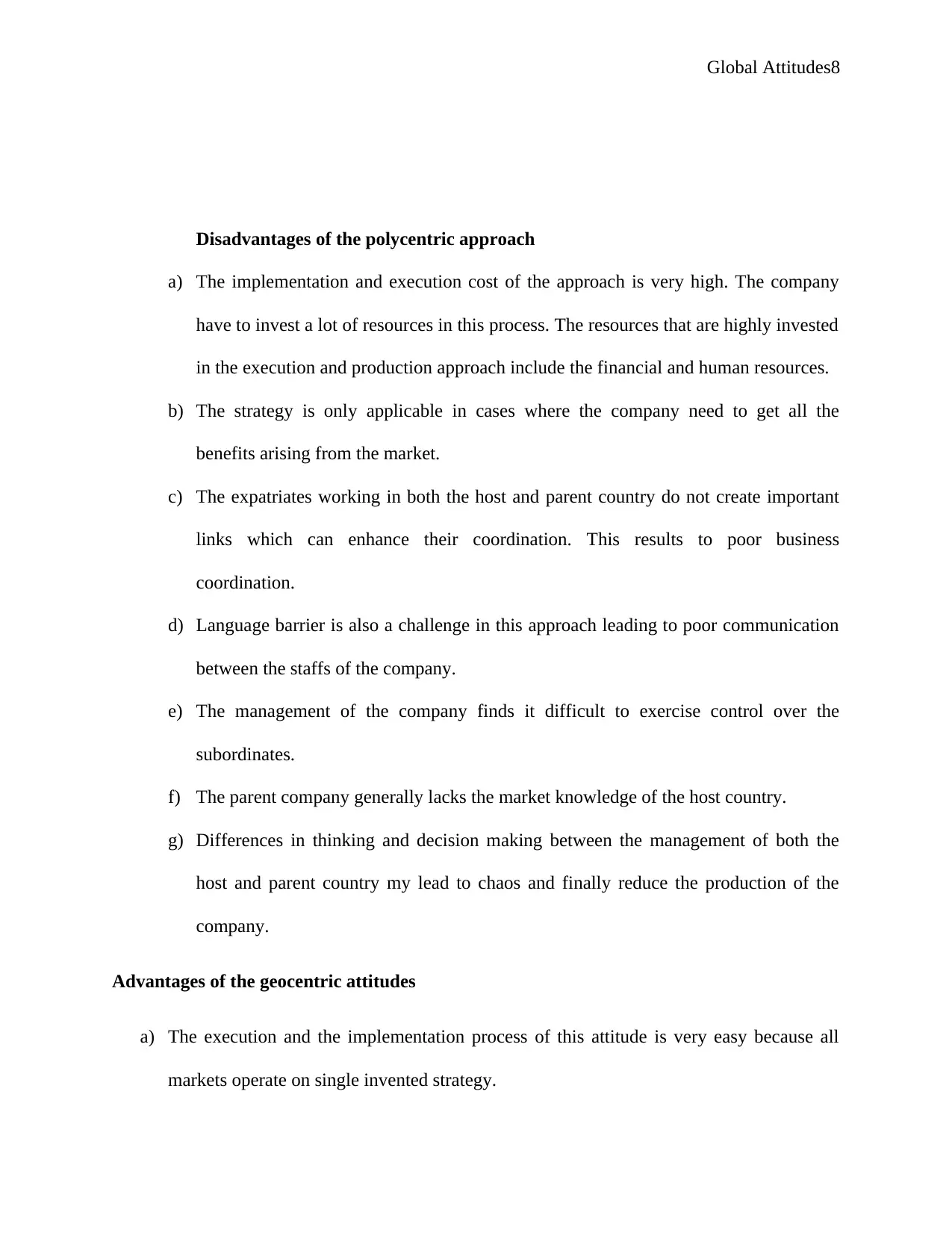
Global Attitudes8
Disadvantages of the polycentric approach
a) The implementation and execution cost of the approach is very high. The company
have to invest a lot of resources in this process. The resources that are highly invested
in the execution and production approach include the financial and human resources.
b) The strategy is only applicable in cases where the company need to get all the
benefits arising from the market.
c) The expatriates working in both the host and parent country do not create important
links which can enhance their coordination. This results to poor business
coordination.
d) Language barrier is also a challenge in this approach leading to poor communication
between the staffs of the company.
e) The management of the company finds it difficult to exercise control over the
subordinates.
f) The parent company generally lacks the market knowledge of the host country.
g) Differences in thinking and decision making between the management of both the
host and parent country my lead to chaos and finally reduce the production of the
company.
Advantages of the geocentric attitudes
a) The execution and the implementation process of this attitude is very easy because all
markets operate on single invented strategy.
Disadvantages of the polycentric approach
a) The implementation and execution cost of the approach is very high. The company
have to invest a lot of resources in this process. The resources that are highly invested
in the execution and production approach include the financial and human resources.
b) The strategy is only applicable in cases where the company need to get all the
benefits arising from the market.
c) The expatriates working in both the host and parent country do not create important
links which can enhance their coordination. This results to poor business
coordination.
d) Language barrier is also a challenge in this approach leading to poor communication
between the staffs of the company.
e) The management of the company finds it difficult to exercise control over the
subordinates.
f) The parent company generally lacks the market knowledge of the host country.
g) Differences in thinking and decision making between the management of both the
host and parent country my lead to chaos and finally reduce the production of the
company.
Advantages of the geocentric attitudes
a) The execution and the implementation process of this attitude is very easy because all
markets operate on single invented strategy.
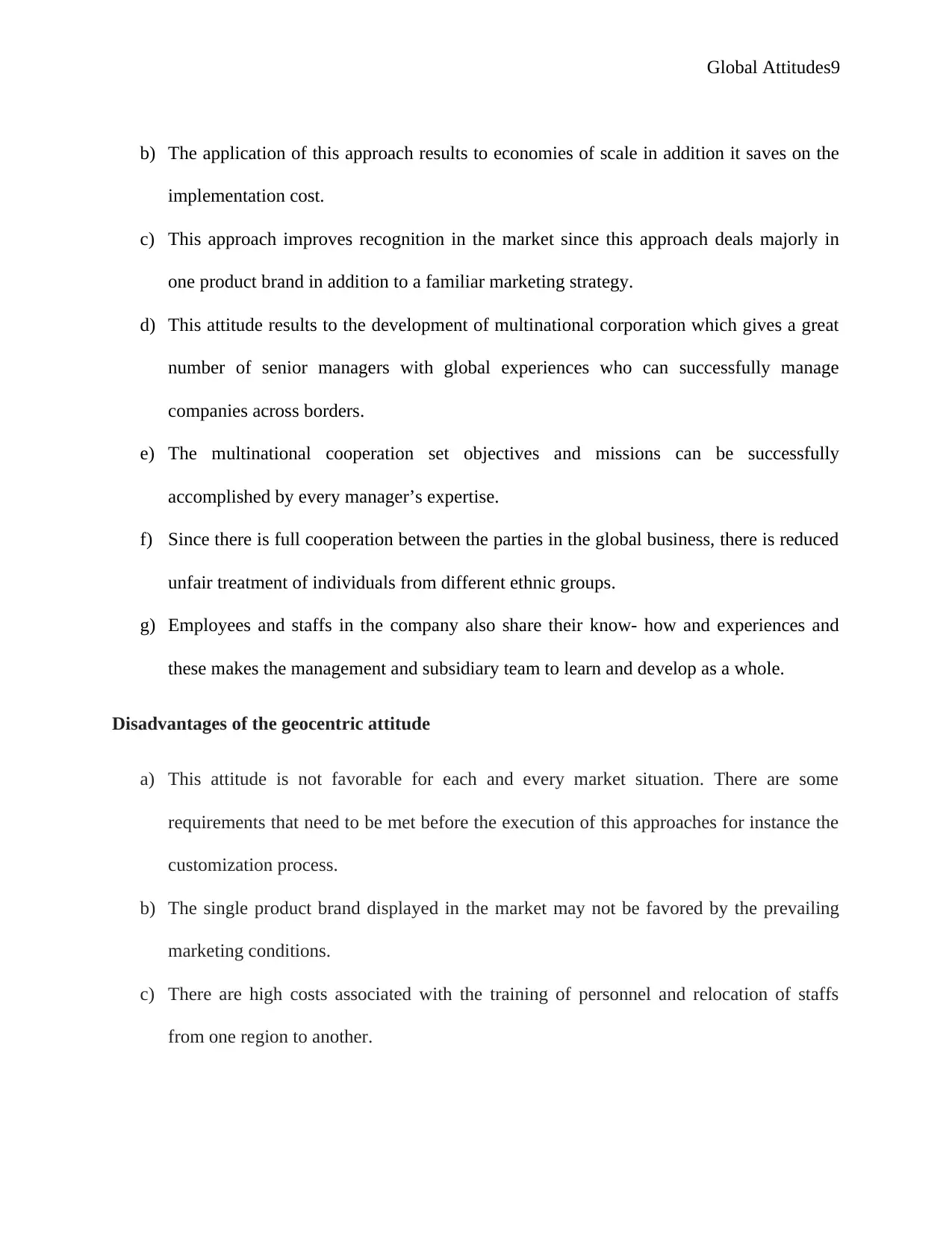
Global Attitudes9
b) The application of this approach results to economies of scale in addition it saves on the
implementation cost.
c) This approach improves recognition in the market since this approach deals majorly in
one product brand in addition to a familiar marketing strategy.
d) This attitude results to the development of multinational corporation which gives a great
number of senior managers with global experiences who can successfully manage
companies across borders.
e) The multinational cooperation set objectives and missions can be successfully
accomplished by every manager’s expertise.
f) Since there is full cooperation between the parties in the global business, there is reduced
unfair treatment of individuals from different ethnic groups.
g) Employees and staffs in the company also share their know- how and experiences and
these makes the management and subsidiary team to learn and develop as a whole.
Disadvantages of the geocentric attitude
a) This attitude is not favorable for each and every market situation. There are some
requirements that need to be met before the execution of this approaches for instance the
customization process.
b) The single product brand displayed in the market may not be favored by the prevailing
marketing conditions.
c) There are high costs associated with the training of personnel and relocation of staffs
from one region to another.
b) The application of this approach results to economies of scale in addition it saves on the
implementation cost.
c) This approach improves recognition in the market since this approach deals majorly in
one product brand in addition to a familiar marketing strategy.
d) This attitude results to the development of multinational corporation which gives a great
number of senior managers with global experiences who can successfully manage
companies across borders.
e) The multinational cooperation set objectives and missions can be successfully
accomplished by every manager’s expertise.
f) Since there is full cooperation between the parties in the global business, there is reduced
unfair treatment of individuals from different ethnic groups.
g) Employees and staffs in the company also share their know- how and experiences and
these makes the management and subsidiary team to learn and develop as a whole.
Disadvantages of the geocentric attitude
a) This attitude is not favorable for each and every market situation. There are some
requirements that need to be met before the execution of this approaches for instance the
customization process.
b) The single product brand displayed in the market may not be favored by the prevailing
marketing conditions.
c) There are high costs associated with the training of personnel and relocation of staffs
from one region to another.
⊘ This is a preview!⊘
Do you want full access?
Subscribe today to unlock all pages.

Trusted by 1+ million students worldwide
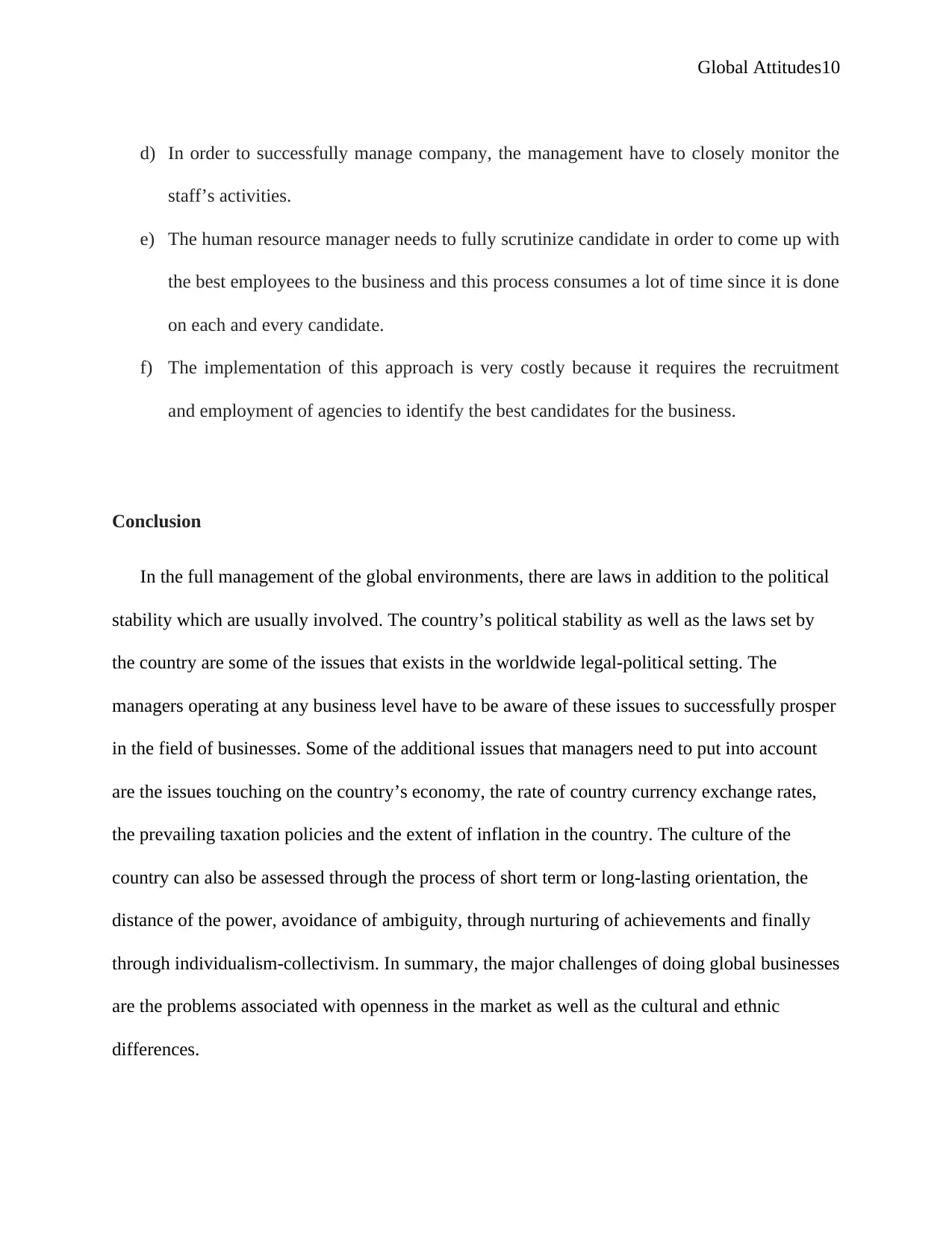
Global Attitudes10
d) In order to successfully manage company, the management have to closely monitor the
staff’s activities.
e) The human resource manager needs to fully scrutinize candidate in order to come up with
the best employees to the business and this process consumes a lot of time since it is done
on each and every candidate.
f) The implementation of this approach is very costly because it requires the recruitment
and employment of agencies to identify the best candidates for the business.
Conclusion
In the full management of the global environments, there are laws in addition to the political
stability which are usually involved. The country’s political stability as well as the laws set by
the country are some of the issues that exists in the worldwide legal-political setting. The
managers operating at any business level have to be aware of these issues to successfully prosper
in the field of businesses. Some of the additional issues that managers need to put into account
are the issues touching on the country’s economy, the rate of country currency exchange rates,
the prevailing taxation policies and the extent of inflation in the country. The culture of the
country can also be assessed through the process of short term or long-lasting orientation, the
distance of the power, avoidance of ambiguity, through nurturing of achievements and finally
through individualism-collectivism. In summary, the major challenges of doing global businesses
are the problems associated with openness in the market as well as the cultural and ethnic
differences.
d) In order to successfully manage company, the management have to closely monitor the
staff’s activities.
e) The human resource manager needs to fully scrutinize candidate in order to come up with
the best employees to the business and this process consumes a lot of time since it is done
on each and every candidate.
f) The implementation of this approach is very costly because it requires the recruitment
and employment of agencies to identify the best candidates for the business.
Conclusion
In the full management of the global environments, there are laws in addition to the political
stability which are usually involved. The country’s political stability as well as the laws set by
the country are some of the issues that exists in the worldwide legal-political setting. The
managers operating at any business level have to be aware of these issues to successfully prosper
in the field of businesses. Some of the additional issues that managers need to put into account
are the issues touching on the country’s economy, the rate of country currency exchange rates,
the prevailing taxation policies and the extent of inflation in the country. The culture of the
country can also be assessed through the process of short term or long-lasting orientation, the
distance of the power, avoidance of ambiguity, through nurturing of achievements and finally
through individualism-collectivism. In summary, the major challenges of doing global businesses
are the problems associated with openness in the market as well as the cultural and ethnic
differences.
Paraphrase This Document
Need a fresh take? Get an instant paraphrase of this document with our AI Paraphraser
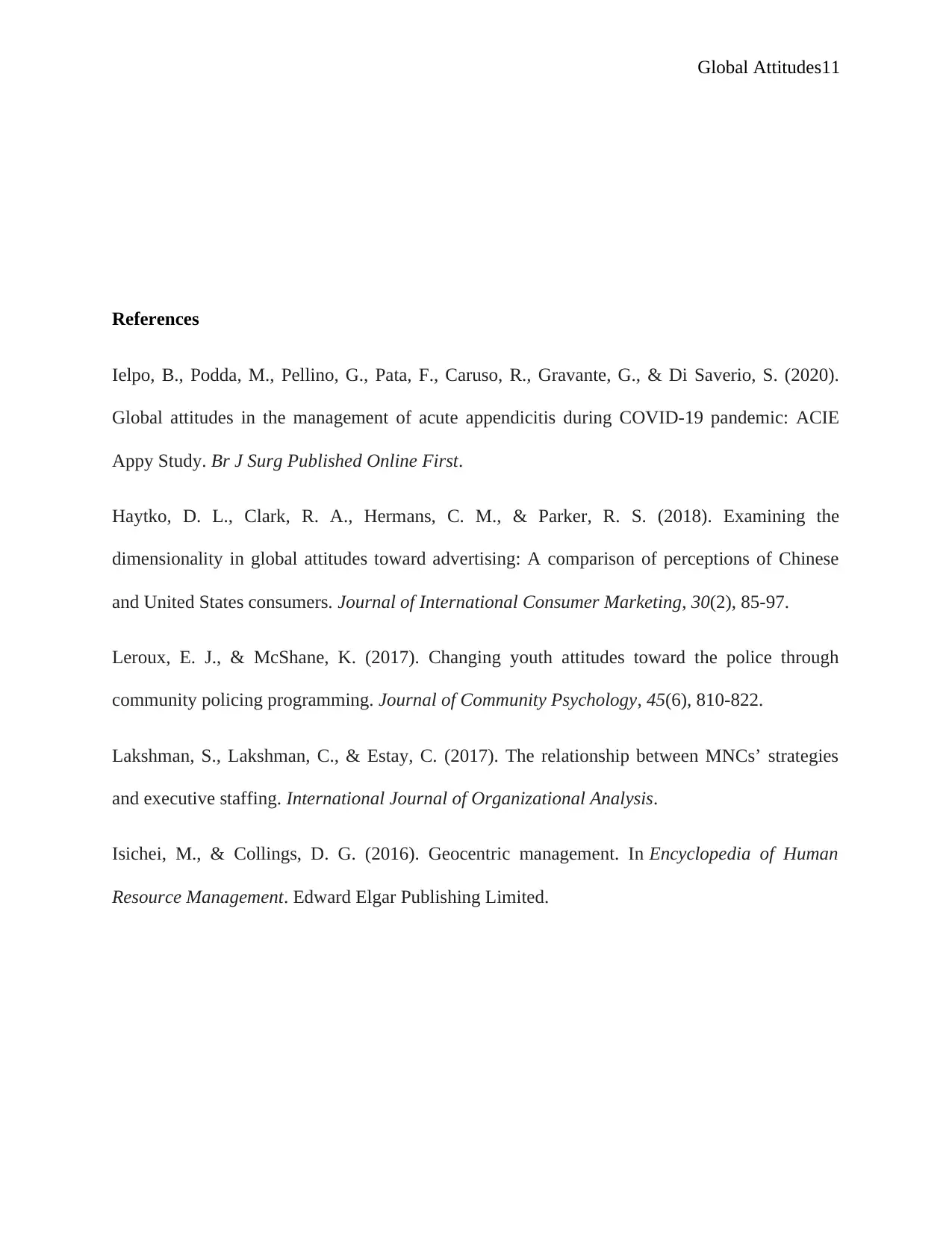
Global Attitudes11
References
Ielpo, B., Podda, M., Pellino, G., Pata, F., Caruso, R., Gravante, G., & Di Saverio, S. (2020).
Global attitudes in the management of acute appendicitis during COVID-19 pandemic: ACIE
Appy Study. Br J Surg Published Online First.
Haytko, D. L., Clark, R. A., Hermans, C. M., & Parker, R. S. (2018). Examining the
dimensionality in global attitudes toward advertising: A comparison of perceptions of Chinese
and United States consumers. Journal of International Consumer Marketing, 30(2), 85-97.
Leroux, E. J., & McShane, K. (2017). Changing youth attitudes toward the police through
community policing programming. Journal of Community Psychology, 45(6), 810-822.
Lakshman, S., Lakshman, C., & Estay, C. (2017). The relationship between MNCs’ strategies
and executive staffing. International Journal of Organizational Analysis.
Isichei, M., & Collings, D. G. (2016). Geocentric management. In Encyclopedia of Human
Resource Management. Edward Elgar Publishing Limited.
References
Ielpo, B., Podda, M., Pellino, G., Pata, F., Caruso, R., Gravante, G., & Di Saverio, S. (2020).
Global attitudes in the management of acute appendicitis during COVID-19 pandemic: ACIE
Appy Study. Br J Surg Published Online First.
Haytko, D. L., Clark, R. A., Hermans, C. M., & Parker, R. S. (2018). Examining the
dimensionality in global attitudes toward advertising: A comparison of perceptions of Chinese
and United States consumers. Journal of International Consumer Marketing, 30(2), 85-97.
Leroux, E. J., & McShane, K. (2017). Changing youth attitudes toward the police through
community policing programming. Journal of Community Psychology, 45(6), 810-822.
Lakshman, S., Lakshman, C., & Estay, C. (2017). The relationship between MNCs’ strategies
and executive staffing. International Journal of Organizational Analysis.
Isichei, M., & Collings, D. G. (2016). Geocentric management. In Encyclopedia of Human
Resource Management. Edward Elgar Publishing Limited.
1 out of 11
Related Documents
Your All-in-One AI-Powered Toolkit for Academic Success.
+13062052269
info@desklib.com
Available 24*7 on WhatsApp / Email
![[object Object]](/_next/static/media/star-bottom.7253800d.svg)
Unlock your academic potential
Copyright © 2020–2026 A2Z Services. All Rights Reserved. Developed and managed by ZUCOL.





